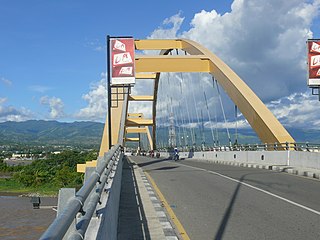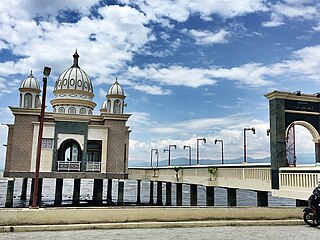
Central Sulawesi is a province of Indonesia located at the centre of the island of Sulawesi. The administrative capital and largest city is located in Palu. The province borders the provinces of Gorontalo to the east, Southeast Sulawesi, South Sulawesi, and West Sulawesi to the south, and sharing maritime borders with East Kalimantan to the west, North Maluku to the east, and Malaysia and the Philippines to the north.

Palu, officially known as the City of Palu, is the capital and largest city of Central Sulawesi Province in Indonesia. Palu is located on the northwestern coast of Sulawesi and borders Donggala Regency to the north and west, Parigi Moutong Regency to the east, and Sigi Regency to the south. The city boundaries encompass a land area of 395.06 km2 (152.53 sq mi). According to the 2020 Indonesian census, Palu had a population of 373,218, making it the third-most populous city on the island after Makassar and Manado; the official estimate as at mid 2023 was 387,493 - comprising 194,340 males and 193,150 females. Palu is the center of finance, government, and education in Central Sulawesi, as well as one of several major cities on the island. The city hosts the province's main port, its biggest airport, and most of its public universities.

Donggala Regency is a regency in the Central Sulawesi Province of Indonesia. It lies between 0° 30" north and 2°20" south latitude, and between 119° 45°" and 121° 45" east longitude, and covers a land area of 5,126.59 km2. It had a population of 277,236 at the 2010 Census and 300,436 at the 2020 Census; the official estimate as at mid 2023 was 308,301. The administrative capital of Donggala Regency is the town of Banawa, located a 30-minute drive (34 km) northwest from the city of Palu, the capital of the province.

Mutiara SIS Al-Jufrie Airport formerly Masovu Airport, is an airport near Palu, the capital city of the province of Central Sulawesi on the island of Sulawesi in Indonesia. As the largest airport in Central Sulawesi, Mutiara SIS Al-Jufrie Airport serves as the main port of entry to the city of Palu as well as the surrounding area. The airport's name can be divided into two part, "Mutiara" and "SIS Al-Jufrie". "Mutiara" means pearl in Indonesian, while "SIS Al-Jufrie" is an abbreviation of Sayyid Idrus bin Salim Al-Jufri (1892–1969), an Arab-Indonesian religious figure and an Indonesian national hero from Central Sulawesi. He was a propagator of Islam in Central Sulawesi until his death in Palu in 1969. SIS Aljufri is also a religious figure and founder of the religious organization Alkhairaat that grew and developed rapidly in eastern Indonesia.
Persipal Football Club is an Indonesian football club based in Palu, Central Sulawesi. In the last season, they actually played in Liga 3 but failed to be promoted after finishing 3rd in the National round Group E. But in mid-2022, they bought Muba Babel United's slot and automatically promoted themselves to Liga 2. Persipal played at Gawalise Stadium in downtown Palu, Central Sulawesi.

Sigi Regency is a regency of Central Sulawesi, Indonesia. It was created on 21 July 2008 by splitting off the southern districts from Donggala Regency. It lies upstream on the Palu River, and immediately south of Palu city, the provincial capital. The regency is almost landlocked; it has a small coastline between Palu city and the western part of Donggala regency. It covers an area of 5,196.02 km2 and had a population of 215,030 at the 2010 Census and 239,421 at the 2020 Census; the official estimate as at mid 2023 was 266,656. The principal town lies at Sigi Biromaru.

Celebest Football Club is a football club based in Palu, Central Sulawesi, Indonesia that competes in Liga 3. Nicknamed Tanduk Anoa, the club was founded as Villa 2000 Football Club based in Pamulang, South Tangerang, changed its name to Celebest in 2016 and moved to its current stadium, Gawalise Stadium, in the same year.

On 28 September 2018, a shallow, large earthquake struck in the neck of the Minahasa Peninsula, Indonesia, with its epicentre located in the mountainous Donggala Regency, Central Sulawesi. The magnitude 7.5 quake was located 70 km (43 mi) away from the provincial capital Palu and was felt as far away as Samarinda on East Kalimantan and also in Tawau, Malaysia. This event was preceded by a sequence of foreshocks, the largest of which was a magnitude 6.1 tremor that occurred earlier that day.
The Palu-Koro Fault or Palu-Koro Fault System is a major active NNW-SSE trending left-lateral strike-slip fault zone on the island of Sulawesi in Indonesia. It caused the 2018 Sulawesi earthquake and tsunami.
Operation Samudra Maitri is the relief effort launched by India to assist the victims of the 2018 Sulawesi earthquake and tsunami in Indonesia. The operation was launched after communication between the Prime Minister of India Narendra Modi and President of Indonesia Joko Widodo on 1 October 2018.
On January 1, 1996, at 4:05 p.m. Central Indonesia Time, an earthquake with an epicenter in the Makassar Strait struck north of Minahasa on the island of Sulawesi, Indonesia. The earthquake measured 7.9 on the moment magnitude scale and was centered off Tolitoli Regency in Central Sulawesi, or 25 km from the Tonggolobibi village. A tsunami of 2–4 m (6.6–13.1 ft) was triggered by this earthquake as a result. At least 350 buildings were badly damaged, nine people died and 63 people were injured.
A moment magnitude 6.2 earthquake struck Majene Regency in West Sulawesi, Indonesia, on 15 January 2021, at 02:28 WITA. The reverse faulting shock initiated at 18.0 km (11.2 mi) depth with an epicenter inland, located 32 km (20 mi) south of Mamuju. It was preceded by a Mw 5.7 foreshock several hours prior. Shaking from the mainshock was assigned a maximum Modified Mercalli intensity of VI (Strong) in Majene and Mamuju. Four of the five regencies in West Sulawesi were affected. More than 6,000 structures were damaged or destroyed; damage was estimated at Rp829.1 billion rupiah. At least 105 people were confirmed dead; nearly 6,500 were injured and thousands were displaced.
The western coast of West Sulawesi was struck by a major earthquake on 23 February 1969 at 00:36 UTC. It had a magnitude of 7.0 and a maximum felt intensity of VIII on the Modified Mercalli intensity scale. It triggered a major tsunami that caused significant damage along the coast of the Makassar Strait. At least 64 people were killed, with possibly a further 600 deaths caused by the tsunami.

Rusdy Mastura is an Indonesian politician who is the governor of Central Sulawesi and was the mayor of the province's capital, Palu, between 2005 and 2015.

The Palu IV Bridge was an Indonesian suspension bridge that was located in city of Palu in the Indonesian province of Central Sulawesi. It spanned the Palu River, directly at its mouth in Palu Bay, and thus connected the districts of Besuru and Lere.

Palu Bay is located on the north coast of Sulawesi in the Indonesian province of Central Sulawesi.

The Floating Mosque of Palu, also known as Arqam Babu Rahman Mosque was a mosque in the city of Palu, Central Sulawesi, Indonesia. The mosque is an icon of Palu, known for floating on Palu Bay.
On 29 November, at 14:10 UTC, a magnitude 7.7 earthquake struck off the southern coast of Taliabu Island Regency in North Maluku, Indonesia. At least 41 people were killed on the nearby islands and a tsunami was triggered. Several hundred homes, buildings and offices were damaged or destroyed.
Lindu is a district of Sigi Regency in Central Sulawesi province, Indonesia. The district concsist of five villages and has its seat in Tomado village. The district has total area of 552.03 square kilometers and had population of 5,949 people as of 2022. The most populated village of the district is Olu with population of 1,966 people in 2022, while the most densely populated village is Puroo with density of 22 people per square kilometre. The district is located inside the Lore Lindu National Park and also contains the Lindu Lake.
















